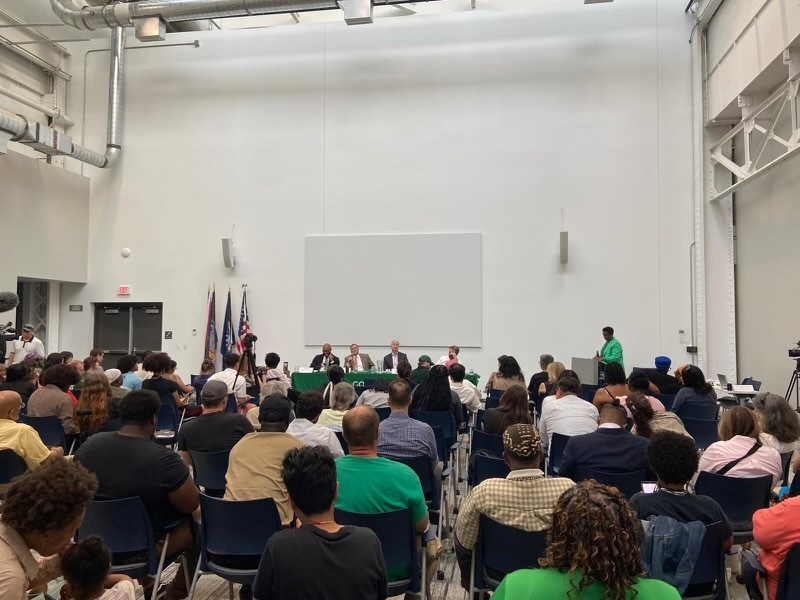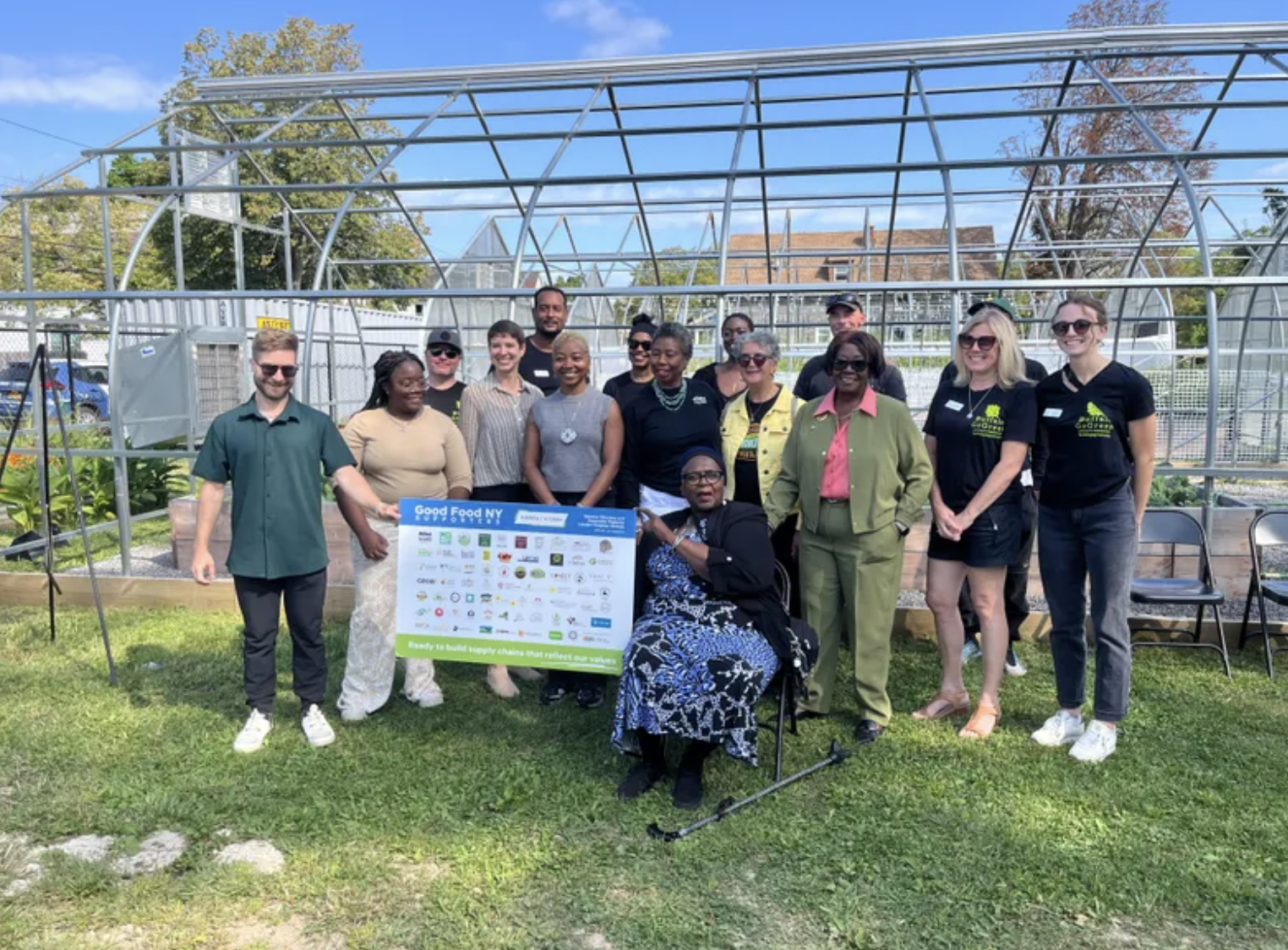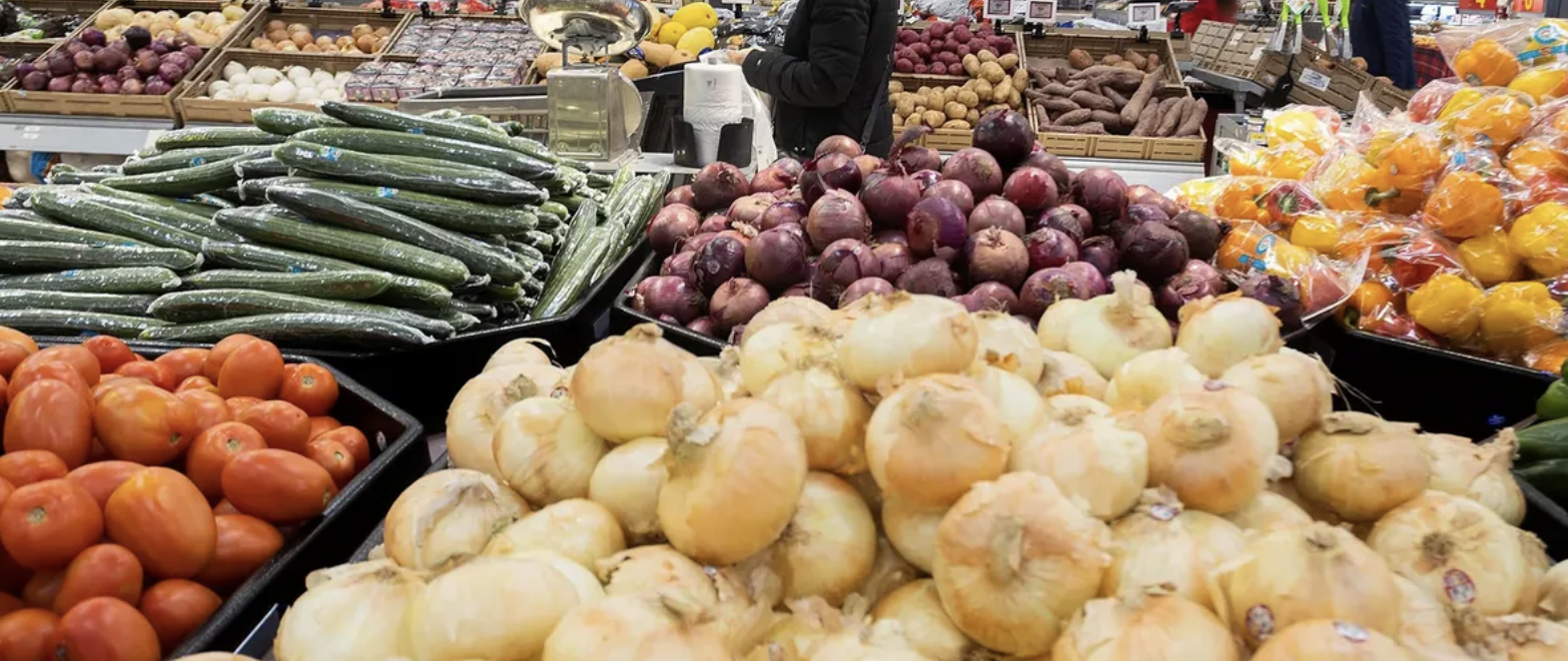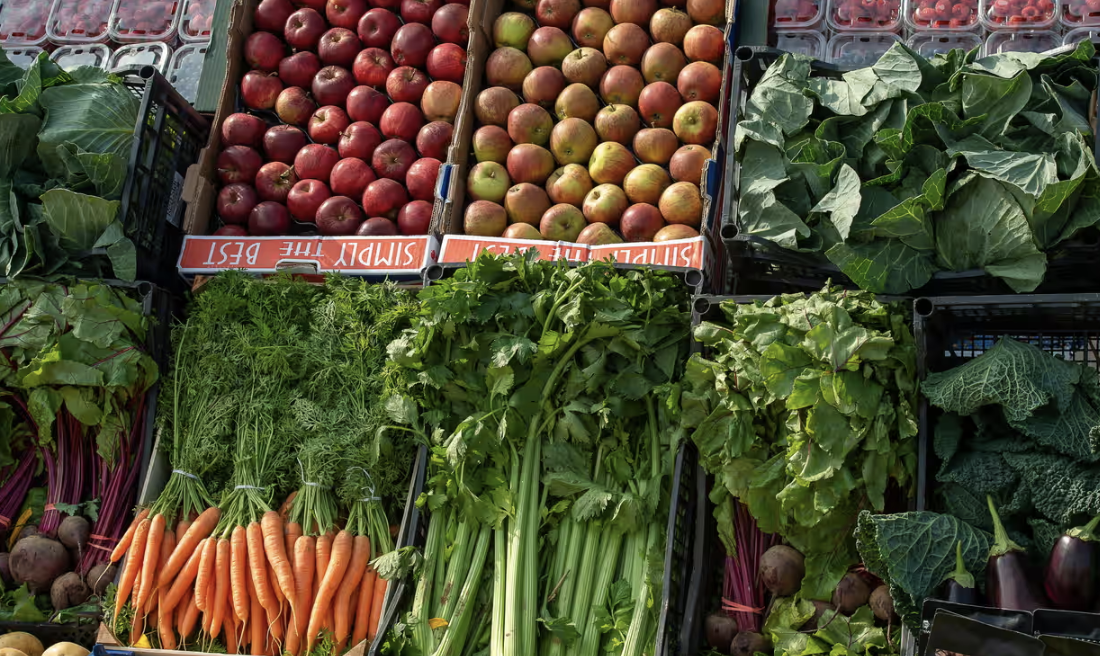Centering Racial Justice Advocacy in the Good Food Buffalo Coalition: Lessons Learned from the 2022 GFPP Policy Roundtable
Harrison Martinez, Jessica Gilbert-Overland, Susanne Donovan, and Rebekah Williams
Good Food Buffalo
INTRODUCTION
The Good Food Buffalo Coalition (GFBC) is a grassroots coalition made up of 27 local organizations working to bring the Good Food Purchasing Program (GFPP) to public institutions in Buffalo and Western New York (WNY). Since its inception in 2018, the coalition has combined activism and research to pass local and statewide legislation that shifts public institutional food procurement practices to align with the five values of the GFPP: local economies, environmental sustainability, valued workforce, animal welfare, and nutrition. Because of the reality of food apartheid, racial disparities in Buffalo, and the resulting impacts on Buffalo residents’ social determinants of health, the GFBC centers racial justice in its work, placing particular emphasis on promoting racial justice in the WNY food system.
In 2022, the GFBC hosted a Policy Roundtable discussion with national partners and several East Buffalo food justice leaders to learn more about the GFPP’s potential to foster racial justice and to ensure that the GFBC’s advocacy efforts center the priorities of most impacted communities. The purpose of the Policy Roundtable was to explore how GFPP policy might address racial injustices in the Buffalo and Western New York (WNY) food systems in ways that move beyond band-aid fixes to address the root causes of these issues. As such, the dialogue between the GFBC’s local and national partners focused on two key themes:
- developing a better understanding of local concerns related to leveraging GFPP policy as a tool to address racial injustice in our food system; and
- learning about potential opportunities to address racial injustice through passing and implementing GFPP policy, particularly as identified by national partners.
A Brief History of Food Apartheid in Buffalo
Buffalo is one of the most segregated cities in the United States. Due to decades of suburbanization, over-policing, federal deregulation, and urban renewal policies, 85 percent of Black folks in the city live in East Buffalo. Food apartheid overlays these segregation patterns. Buffalo’s Black residents are six times more likely than white residents to live in a neighborhood without a grocery store. Many families in East Buffalo are food insecure, with four out of five students qualifying for free or reduced-price lunch at Buffalo Public Schools. By restricting options to participate in their local food system and their access to fresh and healthy food, food apartheid harms Black Buffalonians’ physical and mental health. Today, white residents in Buffalo live an average of five years longer than Black residents. Food apartheid, in addition to other social determinants of health, can therefore be considered a form of racialized violence.
The violent and deadly impacts of food apartheid were tragically highlighted on May 14, 2022, when a white supremacist shot and killed ten people at a Tops grocery store on Jefferson Avenue in East Buffalo. This racially motivated terrorist attack had devastating, immediate impacts on East Buffalo residents by eliminating access to the only grocery store accessible by foot or public transit in that community for two months. The trauma and grief from this attack impacted the long-term mental and physical health of local residents.
There is a long legacy of efforts to address food apartheid in Buffalo. Tops itself, which opened in 2003, was the result of a decade of organizing by residents in East Buffalo who lacked access to a full-service supermarket. Today, many organizations and initiatives continue to build upon this legacy, working to foster racial justice in Western New York’s food system. The GFBC is one of these efforts.
FINDINGS
The GFPP Policy Roundtable employed a series of open-ended questions to generate dialogue amongst the participating local and national partners. Topics of discussion included: panelists’ racial justice goals and priorities for food systems change, their current food justice efforts and policy initiatives, and their concerns and hopes for leveraging the GFPP to advance racial justice in food systems. While the panelists—both local and national—were all working towards similar food justice goals, their opinions often varied. This was particularly the case with regards to the potential impact of the GFPP to generate food system change as opposed to other food justice and food security initiatives, such as food pantries and community-owned food businesses and farms. Significant agreement arose, however, during the discussion of GFPP’s limitations: local and national partners alike shared a resounding skepticism of the GFPP’s ability to alone address the root causes of racial injustice in food systems.
Below is a summary of the perspectives shared at the GFPP Policy Roundtable. These are presented in the same order as the questions and attempt to reflect the panelists’ varying perspectives as accurately as possible.
Racial justice goals and priorities for food justice in Buffalo:
- Food policies must actively recognize and address food apartheid and anti-Blackness in order to transform the food system to one that is racially just. As this is a core goal of the GFBC, it is critical that the coalition take this into consideration.
- Dismantling food apartheid is a critical step towards broader racial justice goals. Residents of East Buffalo experience food apartheid, economic instability, housing insecurity, and numerous other issues, all of which contribute to physical and mental health concerns. Addressing food apartheid (including access to food and self-determination in food systems) is an important pathway for improving the social determinants of health in East Buffalo and thus residents’ health and well-being.
- Situating decision-making power in the most-impacted communities is essential, as they know what they need and what must change to achieve these goals. East Buffalo residents need control and ownership of their food system so that those most impacted by injustices in the local food system are the ones deciding how it needs to be transformed. Allyship is ultimately ineffective (if not harmful) if the people making the decisions aren’t the ones actually impacted by those decisions.
Considerations for food procurement policy to address racial injustice in food systems:
- The communities most impacted by racial injustice in food systems must lead these policy efforts. We must address the root causes of racial injustice in food systems, which entails creating spaces where local people can develop and advocate for a policy agenda to hold legislators accountable to residents’ needs and priorities. The only way to enact lasting and meaningful food systems change is to generate political discourse and action that align with restorative values, operating at the levels of both community and policy.
- It is critical to consider who benefits from passing a particular policy. Does the policy shift decision-making power to those most impacted by the issue at hand? Does the policy unintentionally perpetuate existing injustices?
- Policy work is slow. In the meantime, who is going to feed the people? Undertaking a policy process, particularly a grassroots policy process that addresses such questions and centers the leadership of the communities most impacted by the issues at hand, takes years. Addressing immediate nutritional needs through cooperatives, food pantries, and community organizations— concurrently with policy development—is an essential component of food justice efforts.
- Food justice policies must extend beyond institutions. Food should be treated as a human right. Take Buffalo Public Schools, where all meals are reimbursed by the USDA because such a high number of students qualify for free and reduced-price lunches. By its nature, this reimbursement program ignores the fact that, since the children don’t have food, the parents likely don’t either. This is a testament to many policies’ shortcomings. Food justice policies need to extend beyond institutions, in order to properly address the vast scope of food apartheid.
Limitations of the Good Food Purchasing Program:
- Many BIPOC farmers lack the resources to participate. The GFPP seeks to empower and invest in farm operations whose practices already adhere to at least one of the five values. Such an emphasis inherently places small farmers—particularly BIPOC farmers—at a disadvantage, because they do not have access to the resources needed to achieve certification in these values or to quickly shift their farming operations to align with GFPP values. If BIPOC farmers have to invest resources to participate in the GFPP, then the very methods the GFPP employs to implement values-based food procurement will not achieve their intended outcomes.
- The GFPP operates within an unjust global food system. While it might benefit Buffalo’s communities in many ways, the GFPP cannot transform the global food system responsible for creating and perpetuating food apartheid in East Buffalo. Furthermore, because this program relies on public institutions that must purchase large quantities of food at economies of scale, the GFPP risks reinforcing rather than dismantling existing systems and structures that perpetuate racial injustice in food systems.
- Passing GFPP policy alone is not enough. Legislation is only the first step in the actual creation of change. It can act as a guideline for action, but it does not guarantee that the associated action is taken or that it achieves the intended outcomes. In other words, passing food justice policies does not signify the end to food apartheid or racial injustice in food systems. If we want to ensure the ability of food justice policies to foster racially just food systems, then we must build broader initiatives that address questions related to who benefits, profits from, and controls the food supply chain. In order to do this effectively, GFPP policies must be situated within broader food justice initiatives.
KEY TAKEAWAYS FOR GOOD FOOD BUFFALO COALITION ADVOCACY
By generating a dialogue between the Buffalo coalition and partners working on GFPP policy across the country, the GFPP Policy Roundtable explored local and national perspectives regarding the GFPP’s potential to address racial injustices in the WNY food system. It highlighted key elements, particularly local priorities, that the GFBC should center when passing and implementing GFPP policy. Notably, the GFPP Policy Roundtable revealed significant differences of opinion between local and national partners, and among Buffalo’s local partners themselves, related to the importance of working to pass legislation as opposed to other initiatives designed to address food apartheid. There were also different suggestions for future GFBC advocacy directions and emphases. Most Buffalo partners on the panel urged the GFBC to focus on supporting BIPOC farmers and creating more opportunities for communities most impacted by food injustice to participate in the WNY food system. National partners emphasized the need for policy advocacy and highlighted the importance of building up the GFBC’s membership to include strong representation across all five GFPP values, thereby enabling the coalition to address food injustices holistically by including perspectives and initiatives across many sectors, such as environmental and labor movements.
Despite their different priorities and perspectives, national and local partners alike were united in their commitment to fostering racial justice as a central feature of meaningful food systems change. They also shared a resounding skepticism of the GFPP’s ability to address the root causes of food apartheid and racial injustice on its own; instead, they argued that GFPP efforts must be paired with other initiatives also working to foster racial justice in food systems but using different tools. In other words, panelists stressed that GFPP efforts must be positioned as “one of many tools in the toolbox” used to generate meaningful food systems change.
The following suggestions for GFBC policy advocacy arose from this discussion:
- The GFBC’s efforts to pass and implement the GFPP must coincide with other food justice initiatives working to support small and under-resourced farmers, particularly BIPOC farmers. As GFBC moves towards policy adoption, racial justice should be at the forefront of every decision. This includes securing the resources for BIPOC farmers to expand their farming operations if they wish to do so and to develop the infrastructure needed to sell, process, and distribute food to public institutions.
- While supporting BIPOC farmers should be an essential component of the GFBC’s advocacy, the coalition should not forget that many other groups are impacted by, and are striving to address, food systems issues. The GFBC should ensure that their membership includes organizations representing labor rights, animal welfare, and environmental sustainability. Only with full representation across all five GFPP values can the GFBC adequately work to address and implement these five values into effective policy.
- Only when regional strategies for BIPOC farmer education, land access, technical support, and funding are in place will the GFBC be able to leverage GFPP implementation to foster a racially just food system in Western New York. Because of the small number of BIPOC farmers and business owners, their relatively small production capacity, and the lack of food processing and distribution infrastructure across Western New York, the region is not yet positioned to be able to implement the GFPP in a racially just manner. As such, the GFBC should collaborate with other food justice initiatives in Western New York to support BIPOC farmers and business owners in accessing needed resources and to develop the required infrastructure.
BROADER IMPLICATIONS
While much of the conversation during the GFPP Policy Roundtable focused on Buffalo and Western New York’s food system, many of the opportunities, concerns, and lessons learned from this dialogue might be applied to efforts elsewhere. To this end, the GFBC offers the following insights to local GFPP coalitions across the country and others seeking to advance values-based public institutional food procurement practices:
- Integrate representation across all five GFPP values and local priorities into your coalition. By bringing together organizations advocating for improved nutrition, strong local economies, environmental sustainability, fair working conditions, and animal welfare, the GFPP embraces a holistic approach to food systems change. In doing so, GFPP coalitions unite groups that don’t often work together, support these groups in identifying their overlapping interests and concerns, and expand their power through base-building. At the same time, local GFPP coalitions must ground themselves in local priorities (e.g. racial justice in Buffalo). Doing so will ensure that they are leveraging values-based procurement to address the most pressing food systems issues in their communities and encourage grassroots support for GFPP policy. Panelists noted that many different people contribute to and are impacted by our food system and should have a space to work with others to bring the food system towards a sustainable future. Local GFPP coalitions that uplift all five values while centering local priorities can provide this.
- Secure support from local legislative champions. Partnerships with elected officials, who are genuinely committed to the GFPP, are incredibly important to passing and implementing this program. Having such political champions will greatly facilitate this process because they have the ability to push the GFPP forward. While external grassroots power is essential—and goes a long way toward securing a political champion—passing and implementing the GFPP will take significantly longer and be much more difficult without the support of someone “on the inside.” Local GFPP coalitions should thus take the time to build, maintain, and grow these strategic partnerships as a key component of GFPP advocacy.
- Coordinate GFPP efforts with other food justice initiatives to tackle all facets of food apartheid. As discussed above, the GFPP alone cannot tackle food apartheid; it must be combined with other initiatives that address both immediate food needs (e.g. feeding families via food pantries and other charity work) and the root causes of food apartheid (e.g. policies that support Black farmers in accessing land, capital, and other resources). A single initiative (be it designed to mitigate acute food insecurity or change oppressive systems perpetuating food apartheid) will always have a limited scope; however, together, these initiatives have the power to transform food systems. The GFPP, with its emphasis on institutional procurement, should be a critical component of this broader web of food justice initiatives. Efforts to pass and implement the GFPP must be in coordination with other short- and long-term food justice initiatives.
- Establish networks among different initiatives and communities striving towards similar food justice goals. At its core, the dominant food system is inherently unjust. To transform dominant, industrial food systems to ones that nurture the health and well-being of our communities, we need to build power across food justice initiatives at multiple scales. Developing local, regional, national, and international networks are crucial to doing so. By generating and expanding such networks, local food justice initiatives—including GFPP efforts—expand their access to resources, such as capital, knowledge, and relationships, and build the power needed to transform our food systems.
- Host your own GFPP Policy Roundtable! Because GFPP coalitions unite people and organizations engaged in many different parts of our food systems, many of whom do not regularly collaborate, creating spaces to explore the resulting multitude of priorities and perspectives is important for moving GFPP efforts forward cohesively. Spaces that foster a deeper understanding of these different perspectives can reveal new and innovative solutions to dismantling food apartheid by providing opportunities to compromise, strategize, and ultimately create a plan to implement the GFPP in ways that reflect local goals and priorities. There are many ways to create these spaces; while hosting a GFPP Policy Roundtable is but one format, the GFBC found this experience to be beneficial for establishing the coalition’s future directions and priorities.
Ultimately, as one roundtable panelist said: “We have to think the whole thing through. If we got everything we wanted from the GFPP, how would we implement and mechanize it to best serve our community?”
ACKNOWLEDGEMENTS
We are grateful to the panelists who shared their wisdom and experience during the Good Food Buffalo Coalition’s Policy Roundtable and to the members of the Good Food Buffalo Coalition who made this event happen. We also want to extend our gratitude to Tanya Kerssen (Real Food Media) and Joe Kurtz for their help producing this document.
REFERENCES
Braveman P, Egerter S and Williams DR, “The social determinants of health: coming of age.” Annual Review of Public Health 32: 381-398 (2011).
Blatto, Anna, “A City Divided: A Brief History of Segregation in the City of Buffalo.” Partnership for Public Good, April 2018. https://ppgbuffalo.org/files/documents/data-demographics-history/a_city_divided__a_brief_history_of_segregation_in_the_city_of_buffalo.pdf
Good Food Buffalo Coalition, “Our Coalition at A Glance,” 2020. http://bit.ly/gfbc_at-a-glance
Reese AM, “Rethinking Black Food Culture with Black Food Geographies and Black Food Matters.” In: Garth H and Reese AM (eds) Black food matters: Racial justice in the wake of food justice. University of Minnesota Press, 2020.
Taylor HL, Jung J-K and Dash E, The Harder We Run: The State of Black Buffalo in 1990 and the Present. State University of New York at Buffalo, 2021.
The Food Equity Scholars of the UB Food Lab, “Op-ed: East Buffalo Needs Community-Driven Structural Investments, Not Fly-In, Fly-Out Charity.” Civil Eats, May 24, 2022. https://civileats.com/2022/05/24/op-ed-east-buffalo-needs-community-driven-structural-investments-not-fly-in-fly-out-charity/.







